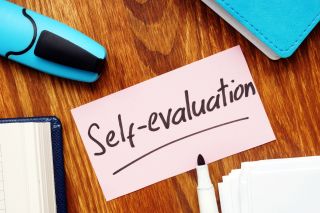More and more organizations are integrating a regular measuring practice into their cultures. The question is: What are they in the habit of measuring? Too often, what gets measured most is removed from what individuals feel they can control. So, the numbers they are always hearing about don’t tell them very much about their own performance and how they specifically can improve.

Andrii/Adobe Stock
When it comes to using self-evaluation to drive continuous improvement, the key is measuring concrete actions within the control of the individual. If you can get into the habit of using self-evaluation tools to measure your own concrete actions against clear, measurable goals, you will put yourself squarely on the path to continuous improvement. Scorekeeping will double as a great source of ongoing, real-time documentation.
The value of self-evaluation
This is why you should care about creating the habit of regular self-evaluation: Research studies show that what really drives learning and growth is real self-awareness through regular, productive, honest self-evaluation against clear standards. That is the fundamental building block for systematically learning any skill.
Without evaluating yourself against some measuring stick, it is very hard to set meaningful, concrete goals for improvement, much less monitor your progress on the way toward meeting those goals. If you want to run far, you should measure your distance. If you want to run fast, you should measure your distance over time. If you want to run smarter, you should measure your training regimen against established best practices. If you want to run for charity, then you need to measure how much money you raise.
The key is to get in the habit of regular self-evaluation against external standards to build greater self-awareness to support your own learning and growth going forward. Remember, the mirror is the best teacher if you learn how to use it to measure your own performance against concrete goals for improvement.
Try this four-step exercise to get started on the path to greater self-evaluation.
1. Brainstorm
Give self-evaluation as broad a definition as you can. Then ask yourself: What does it mean to your boss? Your organization? Your colleagues? And, most importantly, what does it mean to you? Where do these various definitions align, and where do they differ?
2. Consider the following definition of self-evaluation
Self-evaluation means assessing one’s thoughts, words, and actions against clear, meaningful standards and measuring one’s own performance against specific goals, timelines, guidelines, and parameters.
Why do you think this definition of self-evaluation might be successful? Why might this approach be in the best interests of the organization? Why might this approach be in your best interests as an employee?
3. Think of examples
Are there individuals at your organization who exemplify this approach to regular self-evaluation, whether inside or outside of work? Can you describe these examples in detail? What happened? Where? When? Who was involved?
4. Draw on your history
Can you think of a time when you exemplified this approach to regular self-evaluation, inside or outside of work? Can you describe the example in detail? What happened? Where? When? Who else was involved?
